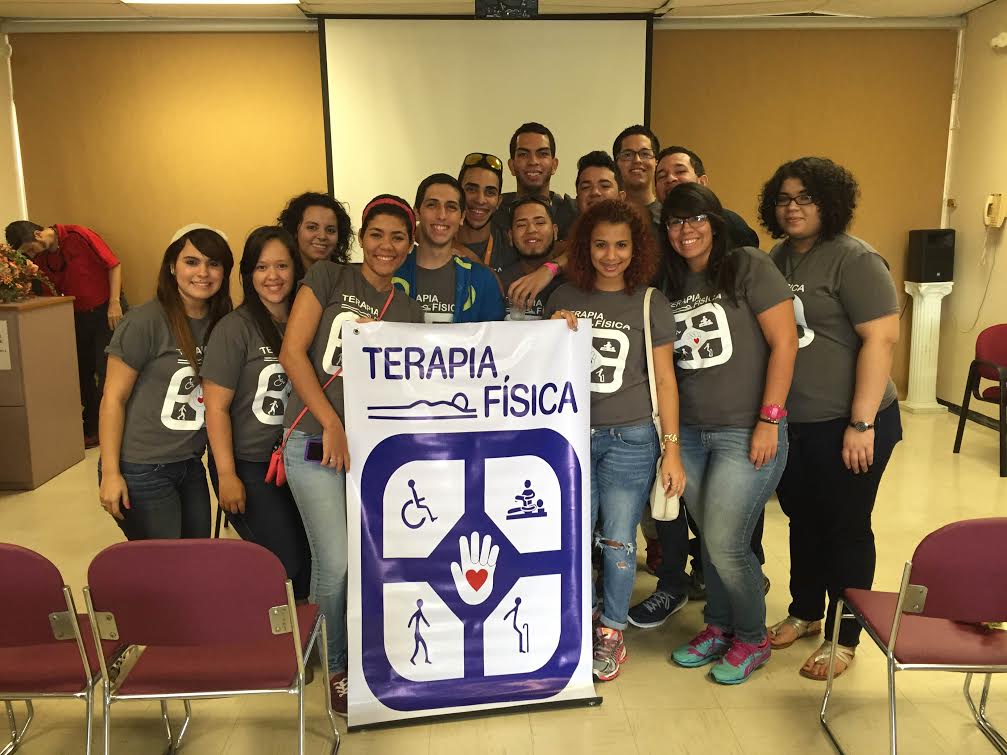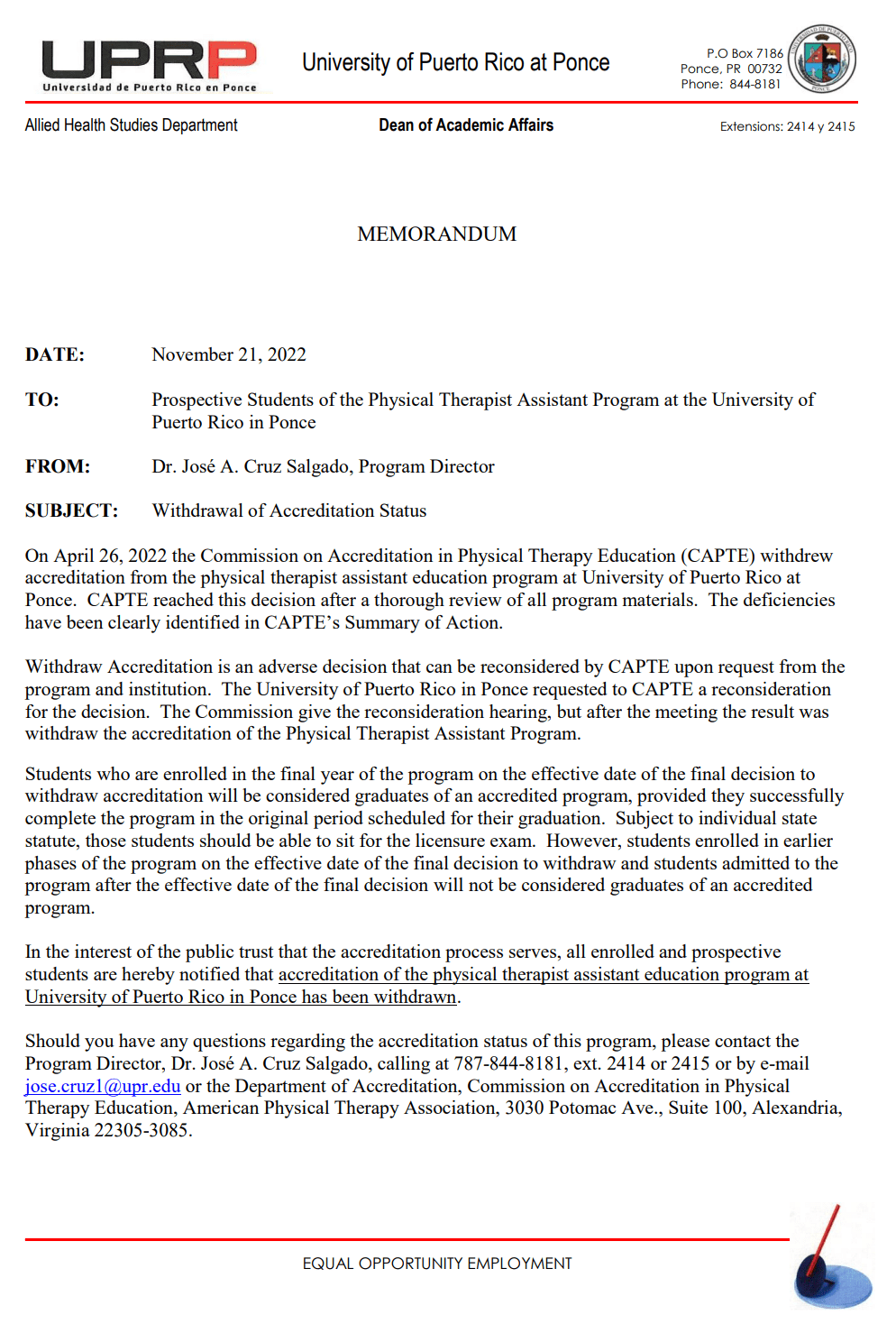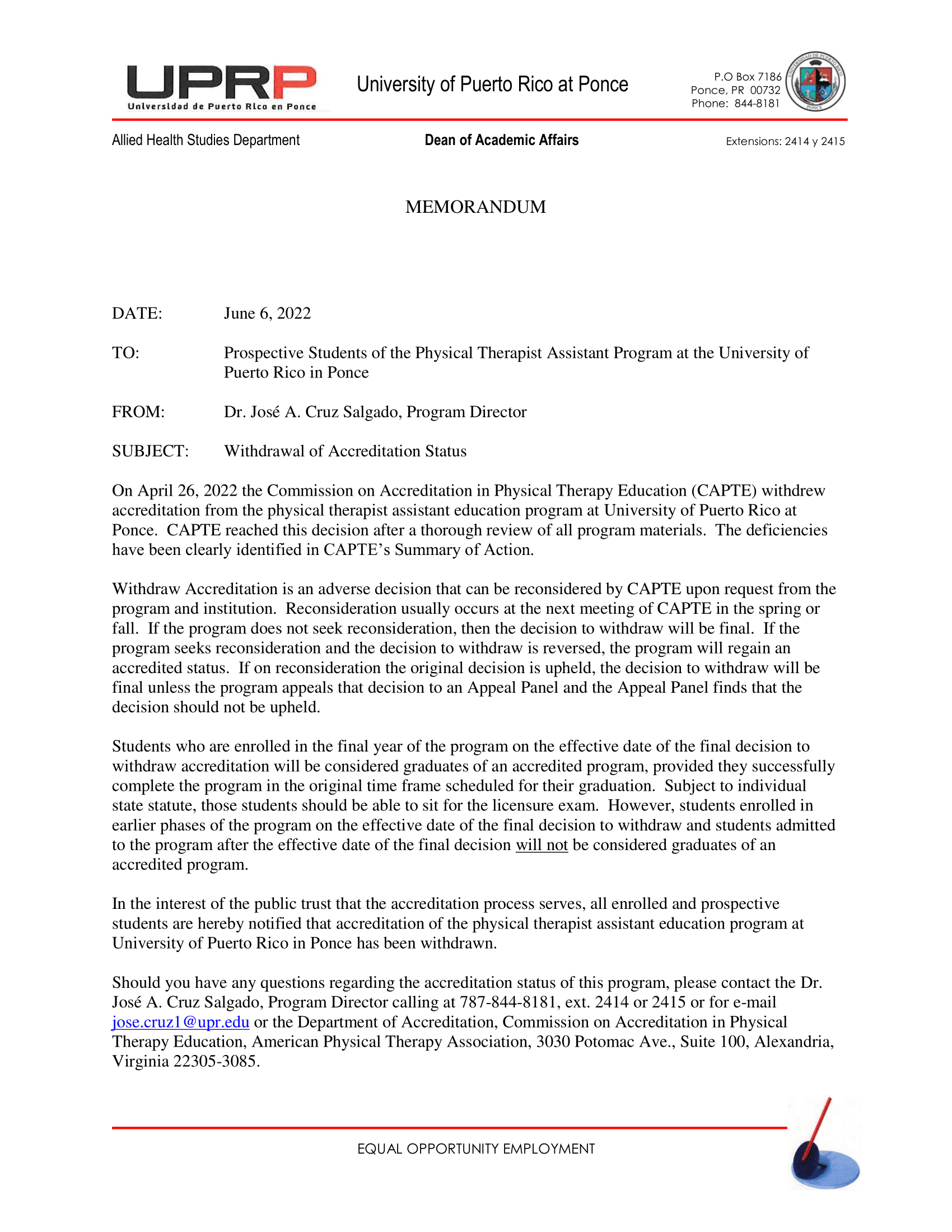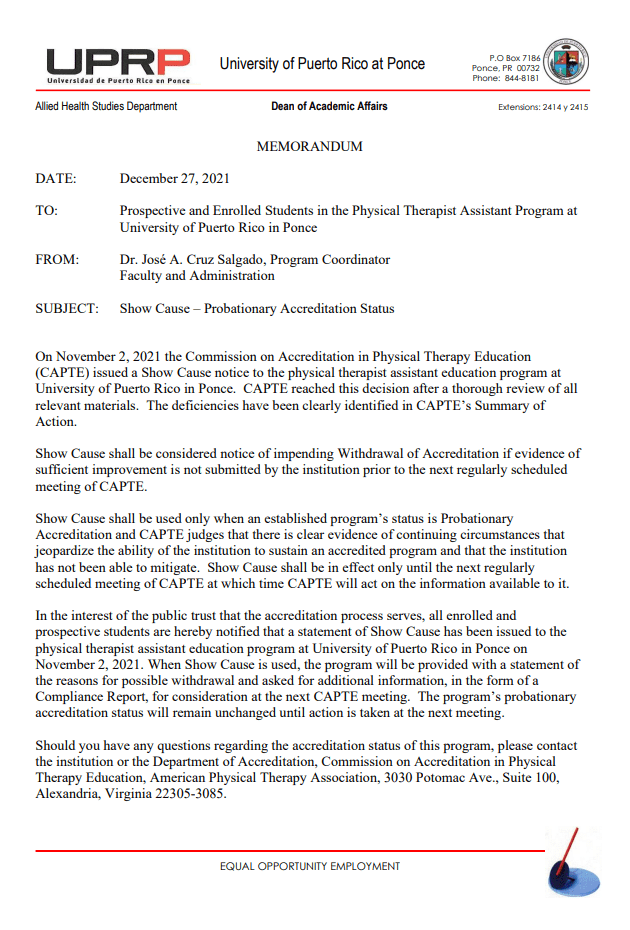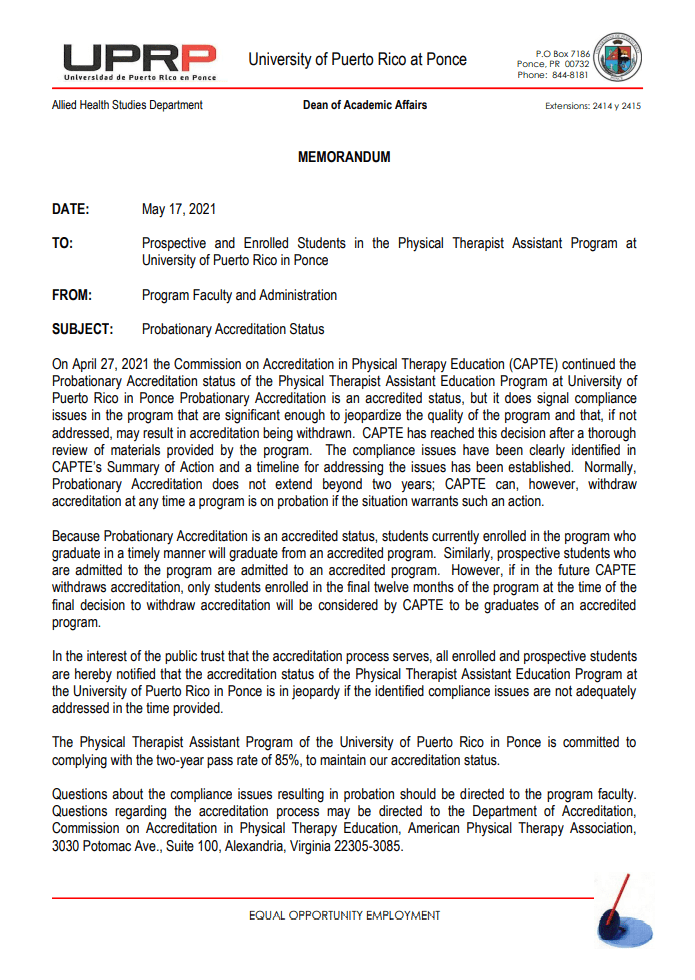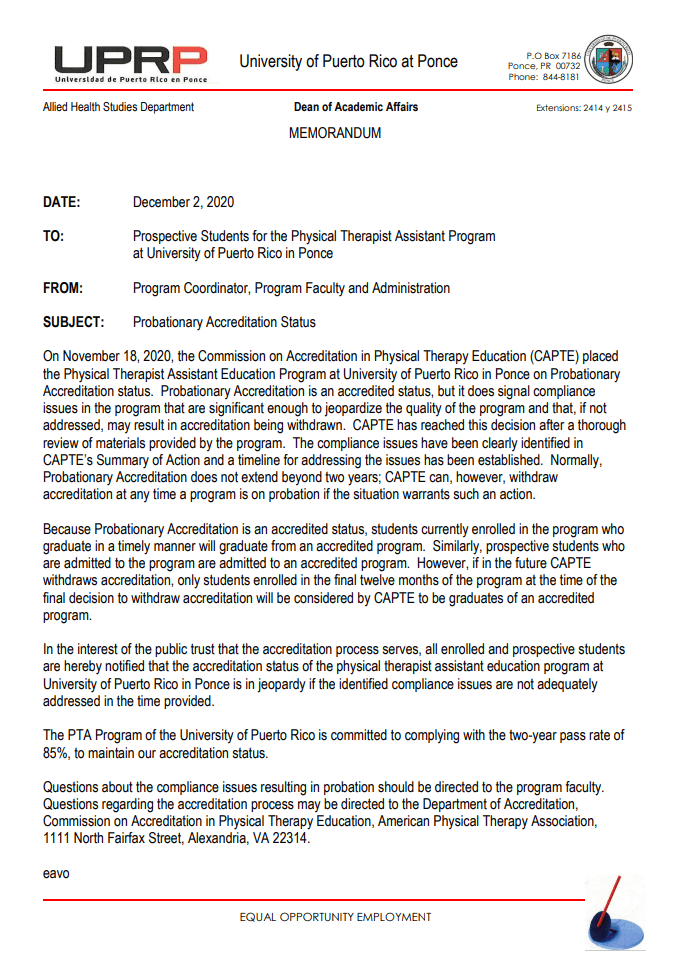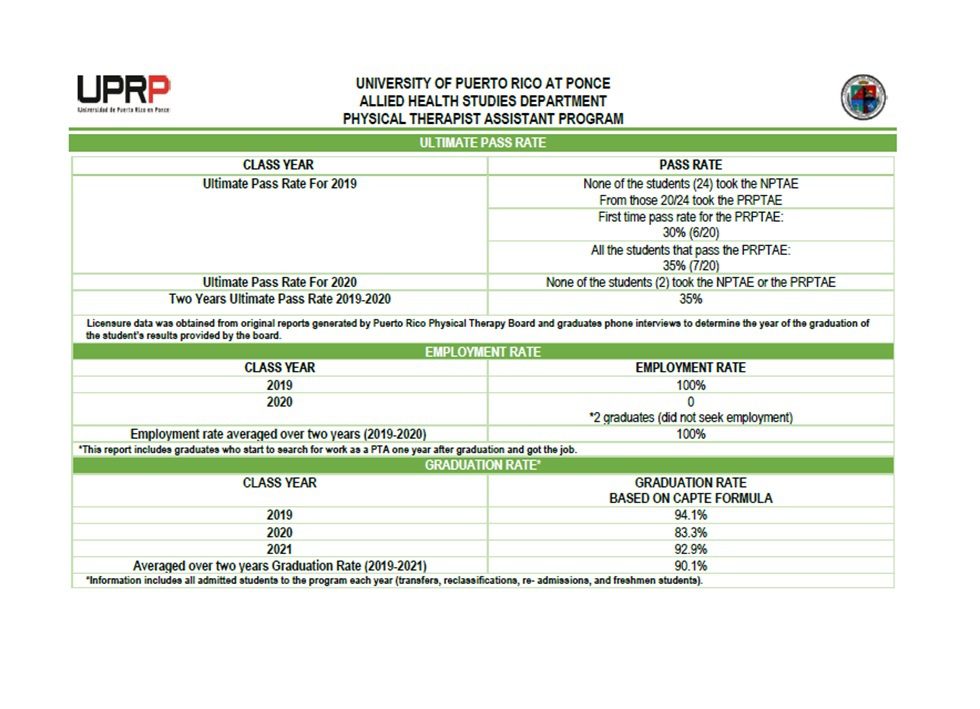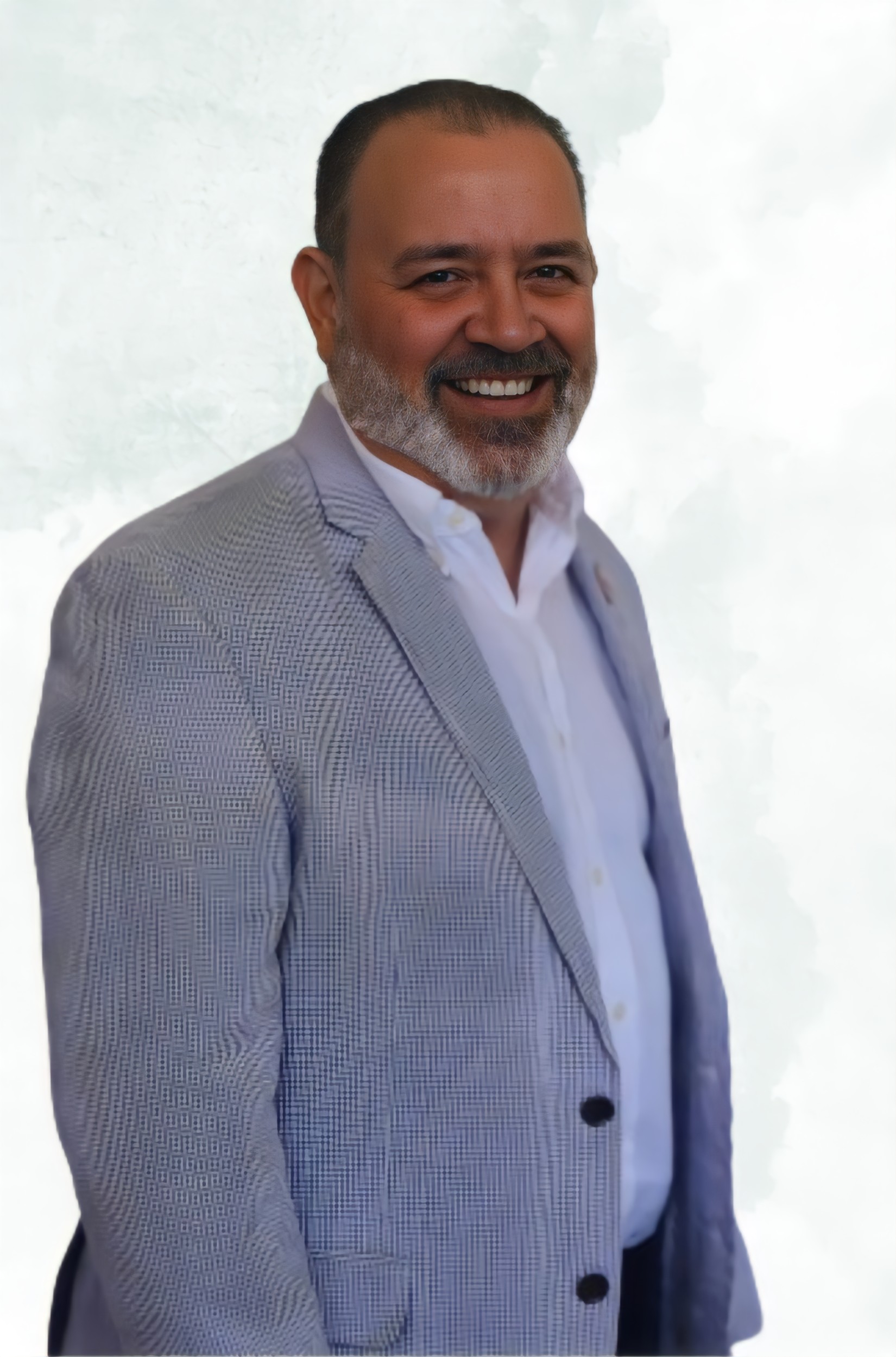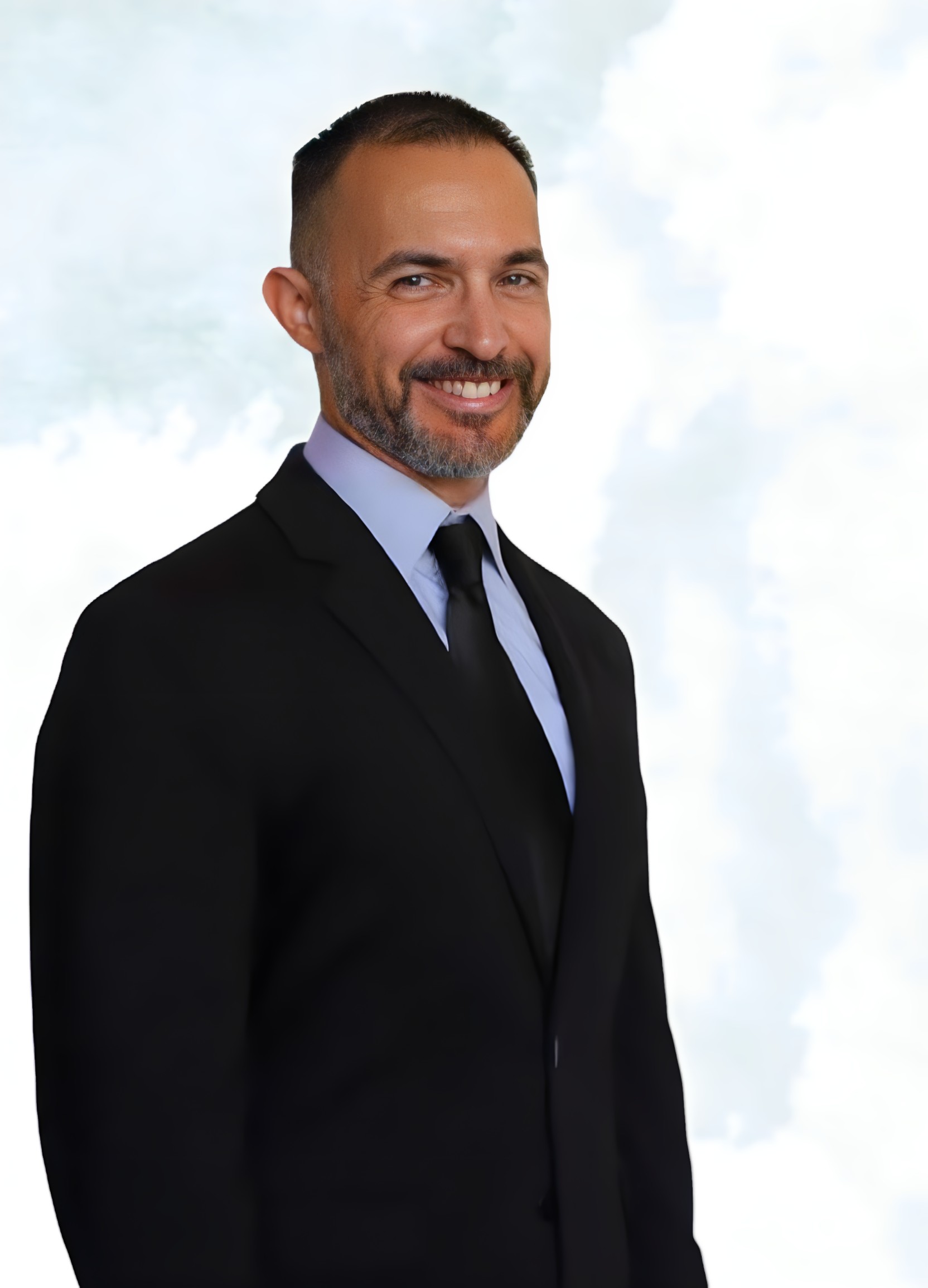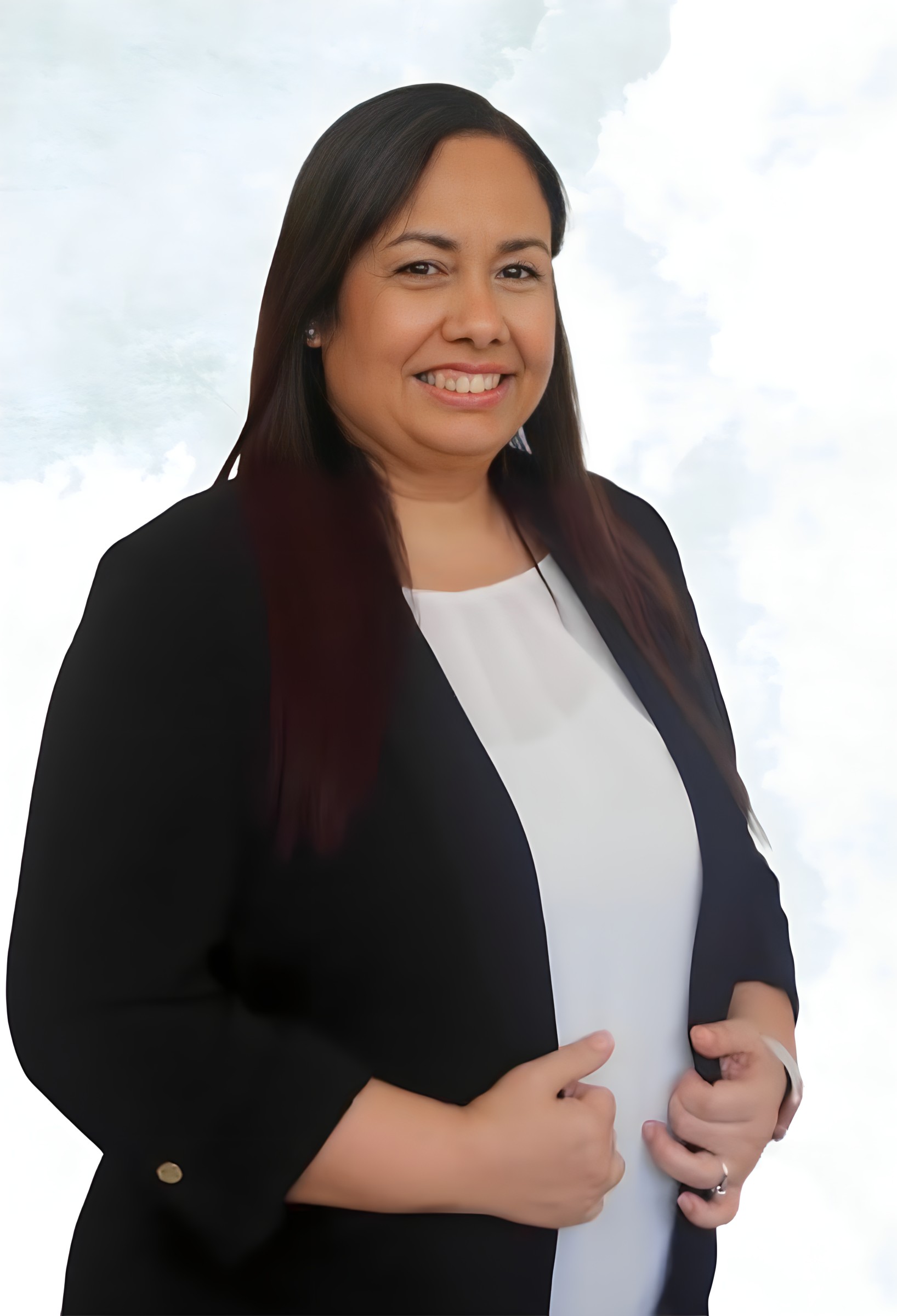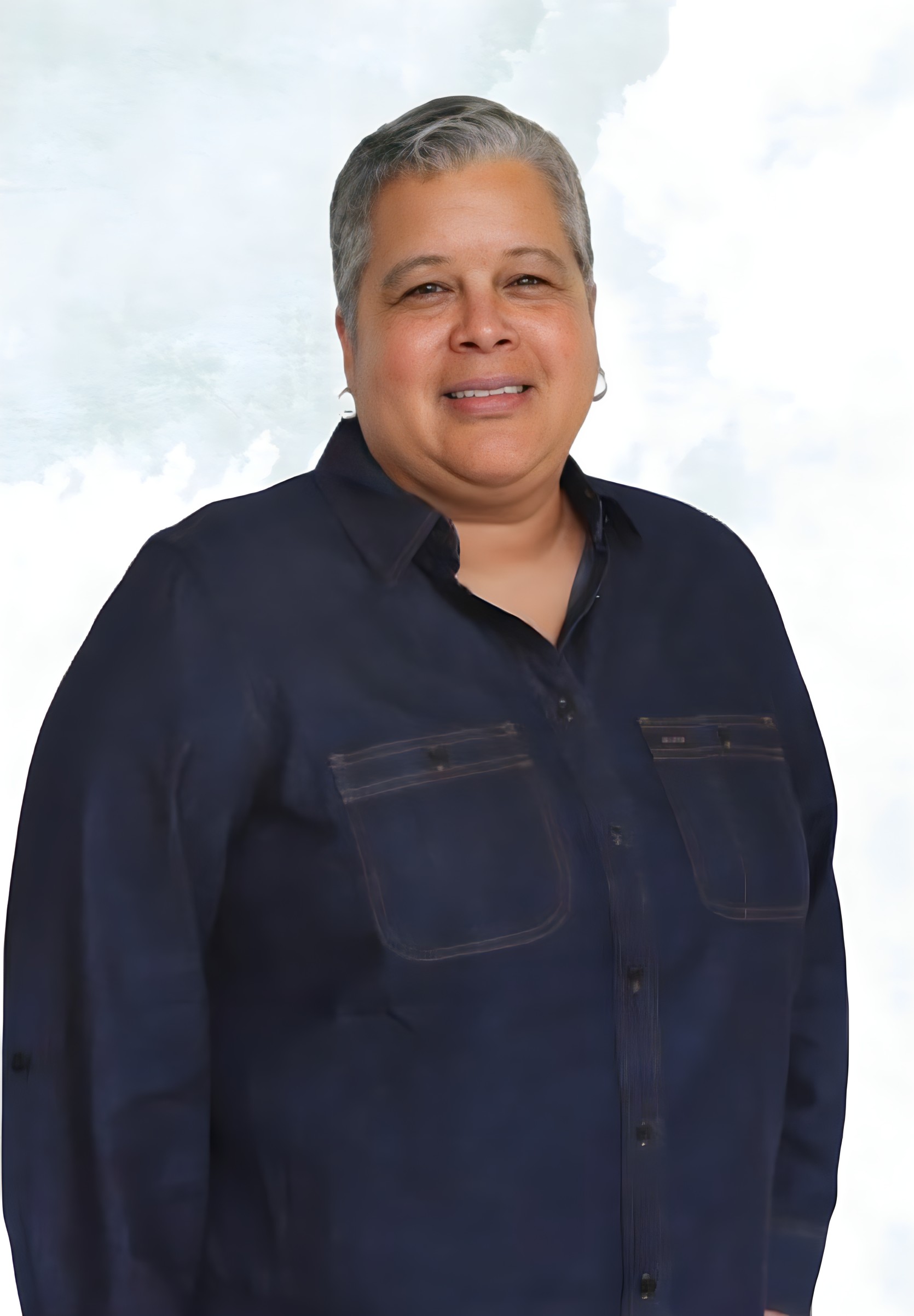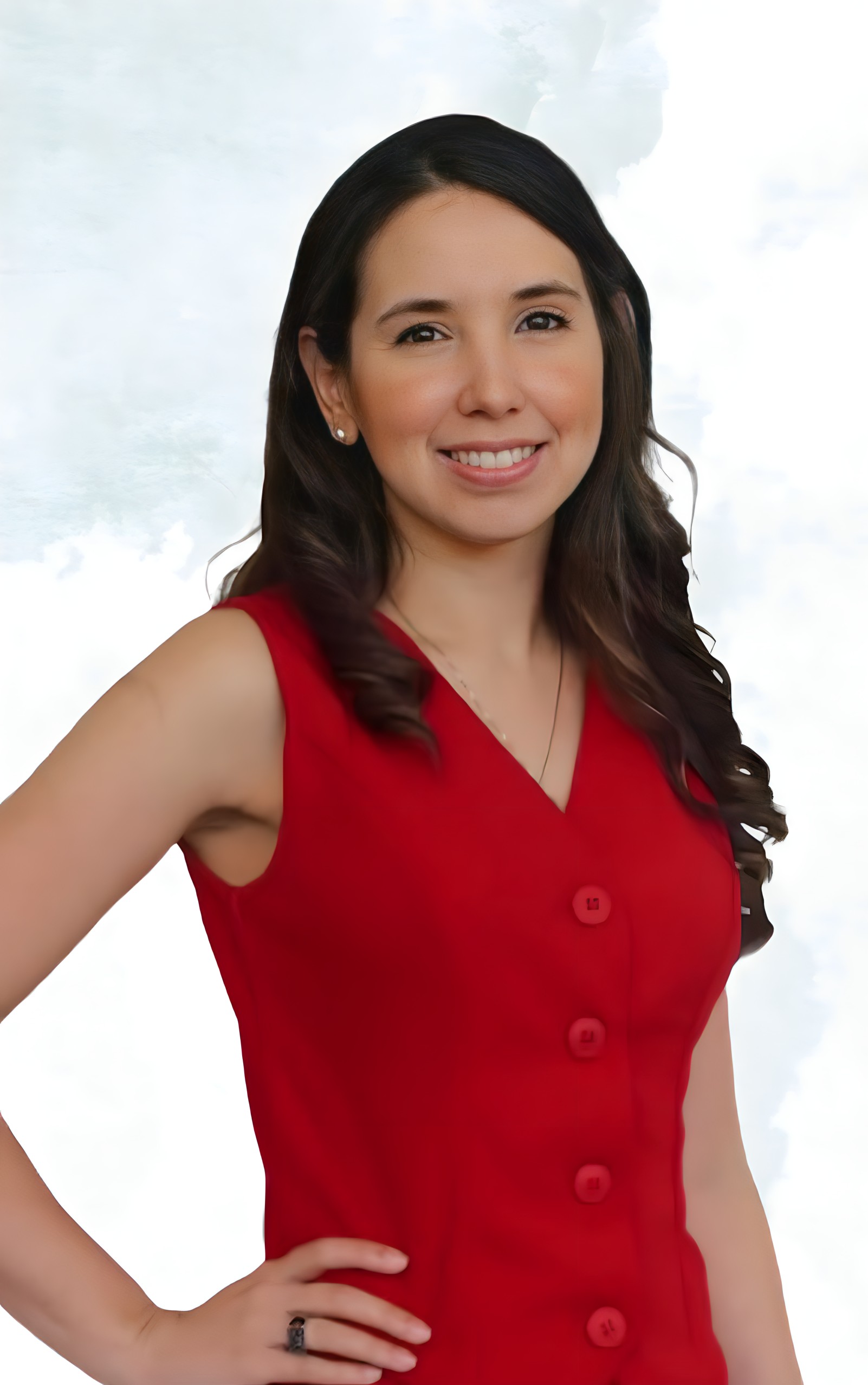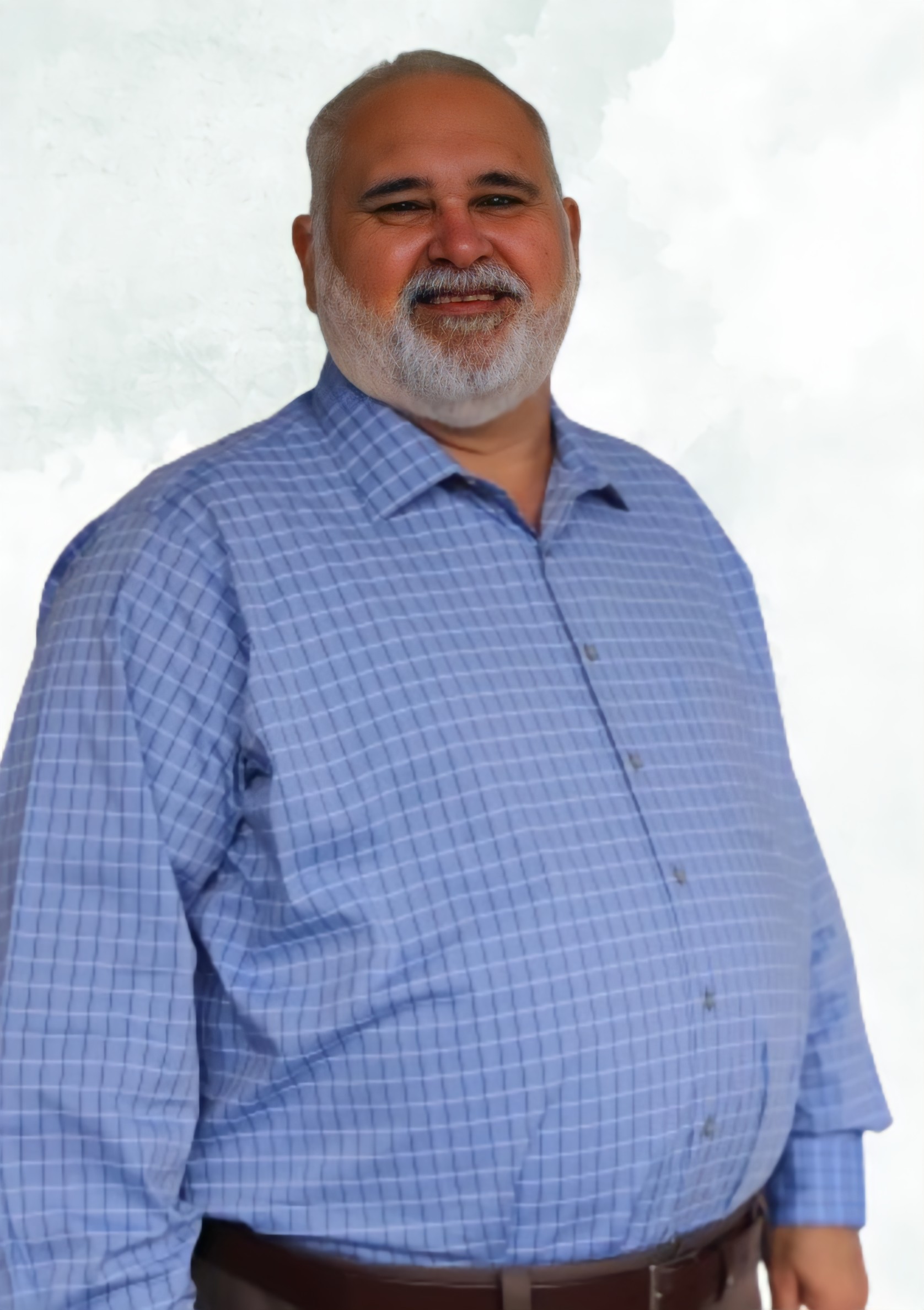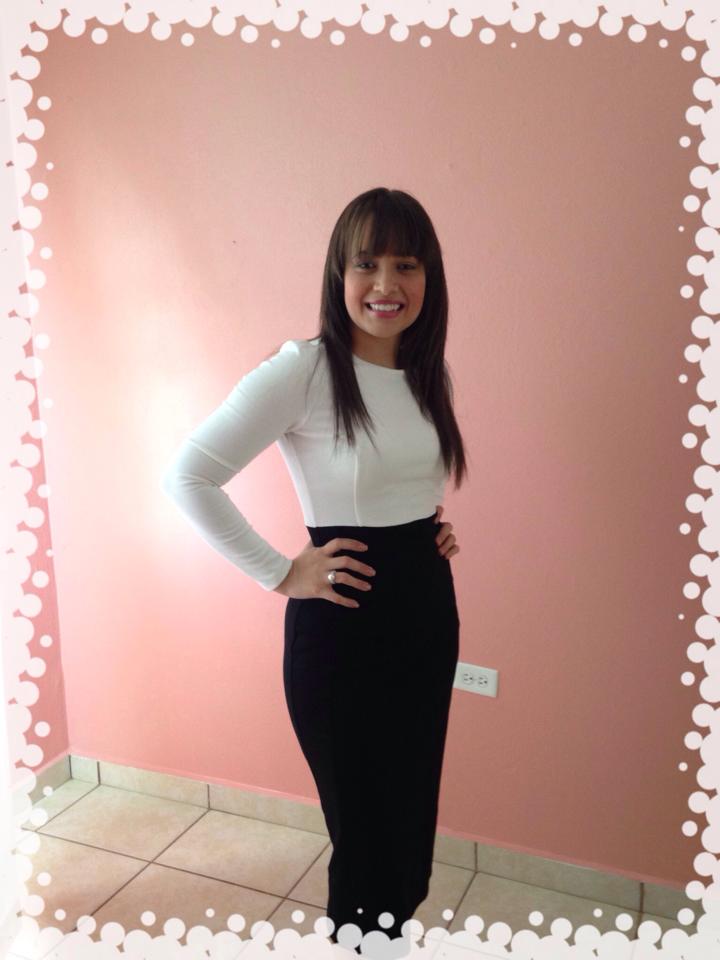
Physical Therapy
Allied Health Studies Department
- Welcome
- Vision, Mission and Program Values
- Goals
- Philosophy
- Concept Definition
- Essentials Functions
- Graduate's Profile
- Admission Requirements
- Curricular Sequence
- Course Description
- Employment Opportunities
- Student Recruitment Material
- Accreditation Status
- Student Manual
- "Students Outcomes"
- License Request Form
- Faculty and Administrative Personnel
Vision, Mission and Program Values
Vision
The Associate Degree in Physical Therapy will be a widely recognized program committed with academic excellence to increasing educational attainment and workforce preparedness. Graduates of our program will provide the highest level of physical therapy services to the community and be the employees’ choice of healthcare providers.
Mission
The Associate Degree in Physical Therapy of the University of Puerto Rico in Ponce prepares Physical Therapist Assistants with the necessary competencies and leadership to fulfill their roles and functions in a safe, legal, ethical and effective manner in a global society, under the direction and supervision of the physical therapist. In accordance with the institutional mission, the program offers an excellent education, maintaining a holistic and comprehensive focus based on the appreciation of the humanistic and ethical values within cultural differences. It fosters a long-life learning process through a challenging environment where the student is guided in an evidence-based learning and practices to better serve the community.
To fulfill this mission the program has the institutional support, of higher education accrediting agencies and a highly qualified faculty involved in research, clinical practice and national and local professionals issues related to the physical therapy practice.
Program Values
The Associate Degree in Physical Therapy endorses the core values established and promoted by the American Physical Therapy Association. These core values are:
-
accountability
-
altruism
-
compassion/caring
-
excellence
-
integrity
-
professional duty
-
social responsibility
Goals
The goals are the means to fulfill the mission of the program. By the achievement of them, the program graduates will perform in the manner expected as established in the philosophical base of the program. The program goals are:
Goal 1: Admit and retain students that possess the academic and professional qualities necessary to achieve the program mission and for the successful program completion
Goal 2: Graduate clinicians who possess entry-level PTA skills to work under the direction and supervision of a physical therapist in a variety of settings.
Goal 3: Prepare students to pass PR PTA Board Examination for state licensure to work as a PTA.
Goal 4: Physical Therapist Assistant Program (PTA) graduates meet the needs of a changing society through employment in various clinical settings.
Goal 5: Prepare Physical Therapist Assistants with the competencies necessary to fulfill the utilizing e roles and functions in Puerto Rico and nationwide.
Goal 6: Prepare Physical Therapist Assistants with the essential knowledge to understand and work with cultural, social, economic, gender, race and belief differences and needs in a changing society within their scope of practice.
Goal 7: Disseminate information about the program and the physical therapy profession.
Goal 8: Maintain the institutional support necessary so the program has the needed resources to fulfill its mission.
Goal 9: Maintain the agreements with the qualified clinical centers to provide the necessary clinical experiences to the program students.
Goal 10: Provide varied clinical experiences in different clinical scenarios to enrich and develop the clinical skills of the students.
Goal 11: Maintain a continuous assessment of all the program components.
Goal 12: Recruit and maintain academic and clinical faculty with the contemporary expertise in assigned teaching areas and professional credentials necessary to provide an excellent education and role model.
Goal 13: Promote faculty participation in academic, scholarly, service and professional development activities in Puerto Rico and nationwide.
Goal 14: Development of the clinical faculty through an improvement plan offered by the institution.
Goal 15: The program will serve as a link between the institution and the external community to facilitate enduring learning and the integration of graduates in the labor field and in the development of activities related to community service and health promotion.
Philosophy
The faculty will be a positive role modeling to benefit the students, other health care providers, and the community. An exchange of affirmative attitudes among students, academic and clinical faculty, and other personnel must be fostered to achieve our philosophy, mission, goals and objectives. The Associate Degree in Physical Therapy Program strives to be an integral part in the formation of its students so that they may be prepared to function as physical therapist assistants under the direction and supervision of a physical therapist in Puerto Rico and elsewhere. Excellence in education will be the essential principle for achieving our purpose, in response to the inalienable right that every human being has to a quality education. The education offered will be holistic and humanistic in nature and characterized by a desire to serve and an understanding of the changing nature of the profession and health care in general which will promote the sensitivity required to satisfy population needs.
“An exchange of affirmative attitudes among students, academic and clinical faculty, and other personnel must be fostered to achieve our philosophy, mission, and goals.”
The curriculum of the Associate Degree in Physical Therapy is designed to meet the standards and the expectations of the student.
Our curriculum includes general education as well as specialized studies resulting in a comprehensive academic program. It promotes a coordinated and sequential learning through two major components of academic and clinical experiences in order to develop students who are flexible and committed with a comprehensive approach of patient care. The curriculum provides students the opportunity to explore personal and professional values, skills and knowledge and apply and integrate this with new information.
The faculty of the Associate Degree in Physical Therapy will be a positive role modeling through service and leadership to the physical therapy profession to benefit the students, other health care providers, and the community. Also is committed with teaching quality and effectiveness to provide the educational experiences necessary to provide students with entry-level skills competitive for the physical therapy profession and the demands of the changing health care environment.
Concept Definition
Who is the Physical Therapist or the Physiotherapist?
The Physical Therapist is the health profession that diagnoses and treats people of all ages, from newborns to the very old, who have medical problems or other health-related conditions that limit their ability to move and perform functions in their daily lives. Physiotherapists examine each person and develop a plan of care to promote the ability to move, reduce pain, restore function and prevent disability. In addition, they work with individuals to prevent the loss of mobility before it occurs through the development of fitness and wellness programs to promote healthier and more active lifestyles. Physical Therapists serve in a variety of settings, including hospitals, private practices, clinics, home health agencies, schools, sports and fitness, labor scenario and nursing homes. The State License is required in each state in which physical therapy is practiced.
What is Physical Therapy or Physiotherapy?
The terms «physical therapy» and «physiotherapy» and the terms «physical therapist» and «physiotherapist» are synonymous. As essential participants in the health care delivery system, physiotherapists assume leadership roles in rehabilitation, prevention, health maintenance and health, well-being and physical fitness promotion programs in professional and community organizations. Physiotherapists also play important roles both in developing standards for the practice of the physiotherapist and in the development of health care policies to ensure the availability, accessibility and optimal provision of health care services. Physical therapy is covered by federal, state and private insurance plans. The services of physiotherapists have a positive impact on the quality of life related to health. As clinicians, physiotherapists engage in an examination process that includes the collection of information regarding patient / client medical history, performing a systems review, and performing tests and measures to identify potential and existing problems.
Who is the Physical Therapist Assistant?
The Physical Therapist Assistant (PTA) works as part of a team to provide physical therapy services under the direction and supervision of the physiotherapist. The Physical Therapist Assistant executes the patient / client interventions (treatments), obtain data related to the interventions that are provided and make modifications in the interventions, either for the patient/client as indicated by the physiotherapist or for the patient / client security and comfort. The Physical Therapist Assistant (PTA) helps the Physical Therapist in the treatment of individuals of all ages, from newborns to the very old, who have medical problems or other health-related conditions that limit their ability to move and perform functional activities in their daily life.
General Functions of the Physical Therapist Assistant
Is the professional that helps the physiotherapist in the implementation of the treatment program according to the plan of care. Together with the physiotherapist, is responsible for the care of the patient / client and the environment in which he / she is during the course of treatment, follows established procedures and observes safety precautions in the application of therapeutic modalities. Perform therapeutic exercises, massages, training in ambulation activities and daily life. Take care of orthoses, prosthesis and any other equipment used by the patient / client. Record and inform the Supervisor of the patient’s conditions, reactions and responses. Is responsible for the maintenance of equipment and materials. Attend other delegated responsibilities.
Essentials Functions
The Physical Therapist Assistant Program at the University of Puerto Rico in Ponce has been designed with the purpose of preparing students to enter the profession of the Physical Therapist Assistant with the knowledge and skills and competencies necessary to execute successfully. To fulfill our responsibility, it requires that the student meet both the academic standards and the essential functions of the program.
Essential functions refer to the acceptable demonstration of proficiency and / or competence in the skills taught throughout the program. The faculty members, using different means including theoretical and execution exams in the different courses through the program, evaluate the acceptable levels of proficiency and competence. The essential functions carry the physical, mental, psychosocial and communication characteristics and skills that are necessary to meet the demands of the educational process and the safe therapeutic care of patients, as well as, with all the associated tasks carried out by a PTA
Applicants need to become familiar with the essential functions so that they understand the demands of the profession. All students accepted into the Program must comply with the essential functions, skills and abilities required to provide the patient with a safe practice with or without reasonable accommodation. Adopting these essential functions, the Physical Therapy Assistant Program ensures that the rights of patients are met and that they receive a safe and quality treatment by an Assistant Physical Therapist.
The essential functions of our program are the following:
Cognitive Skills
Ability to collect, interpret and integrate information to make logical decisions and evaluate outcomes.
-
Meet class standards for successful course completion including maintain at least a “C” grade in all course work required for Associate Degree in Physical Therapy.
-
Prioritize multiple tasks and carry out complex sequence of instructions.
-
Read, measure, calculate, reason, and analyze information.
-
Use problem-solving skills to promote safety and to transfer learning from one situation to another and make appropriate decisions in a timely manner.
-
Apply critical thinking skills to a variety of subjects.
-
Interact effectively and appropriately with patients of various ages, behaviors, cognitive abilities, cultures and ethnic backgrounds.
-
Read, comprehend, analyze and apply relevant information from a variety of sources (textbooks, computers, medical records and professional literature) accurately, thoroughly and quickly.
-
Know when & how to apply universal precautions (mask, gown, goggles, gloves).
-
Assess & monitor patient problems and appropriately adapt interventions as indicated.
-
Respond calmly and effectively to emergencies.
Affective Behavioral Skills
It is the ability to respond appropriately to stressful environments or during impending deadlines.
-
Respond appropriately to stress of heavy workloads, deadlines, demanding patients and life-threatening clinical situations.
-
Display maturity, good judgment sensitivity, and emotional stability when in classroom, lab and clinical settings.
-
Embody the spirit of cooperation and collegiality, employing basic conflict management skills, as situations require.
-
Establish positive and supportive rapport with patients/clients and colleagues.
-
Participate in all labs situations to experience both clinician and patient roles, receiving and communicating empathy.
-
Establish positive, supportive, effective and harmonious relationships in diverse academic and professional settings.
-
Manage heavy academic schedules and deadlines.
-
Concentrate on professional duties without distraction in all settings.
-
Set priorities and perform all aspects of therapy services in fast-paced academic and clinical situations
-
Cope effectively with psychosocial issues involving illness, disability and death without hindering effective performance of duties.
-
Recognize and respond appropriately to psychosocial and cultural impacts of dysfunction/ disability.
-
Recognize and respond appropriately to individuals of all ages, genders, races, religious, cultural and socio-economic backgrounds.
Communication Skills
It is the ability to communicate in Spanish or English using verbal, non-verbal and written formats. Communicate effectively in Spanish or English with faculty, other students, patients, families and health care professionals.
-
Explain and demonstrate physical therapy interventions in both oral and written formats.
-
Proper use of medical terminology, grammar, spelling and punctuation in classroom, lab and clinical environments and ability to record information in a timely manner.
-
Display active listening skills.
-
Recognize, interpret and respond to nonverbal behavior of self and others.
-
Record thoughts legibly and clearly for written assignments.
Sensory Skills
Enough auditory, visual and tactile ability to monitor and assess health needs. Use visual, auditory and tactile senses to observe patients and collect and interpret data.
-
Demonstrate effective visual acuity to be able to observe and assess a patient 10 feet away.
-
Demonstrate effective visual acuity to be able to set and read dials involved in the application of physical agents and mechanical agents to include thermal agents, biofeedback, compression therapies, cryotherapy, electrotherapeutic agents, hydrotherapy, superficial and deep thermal agents and traction.
-
Demonstrate auditory acuity to be able to respond quickly to an auditory timer.
-
Perform palpation and physical assessment including palpating pulse, detecting changes in skin texture/temperature/contour and muscles tone. Provide appropriate manual resistance during exercise.
-
Demonstrate sufficient hearing to communicate with patients and other members of the health care team, monitor patients by hearing instrument signals and alarms.
-
Demonstrate sufficient smell sense to assess patient status and maintain a safe practice environment.
Psychomotor Skills
Demonstrate enough gross & fine motor abilities to provide safe and effective physical therapy interventions.
-
Safely grasp and manipulate small objects and dials.
-
Sit, stand, walk up to 2 hours without a break.
-
Ability to perform lifting, carrying, pulling, pushing, reaching, crawling, kneeling, climbing and walking using proper body mechanics.
-
Move, adjust & position patients or equipment, which involves bending, stooping to the floor, reaching overhead, lifting, pulling or pushing up to 250 lbs.
-
Perform CPR and emergency care.
-
Use equipment that emits electrical, ultrasonic, thermal energy.
-
Execute skilled movement required for safe and effective physical therapy treatment
-
Demonstrate adequate speed, agility, coordination & balance to safely train and assist patients walking on uneven terrain, stairs, curbs, ramps, grass, gravel.
-
Palpate anatomical structures and handle injured body parts without causing injury to the patient.
-
Demonstrate & perform exercise programs and functional activities required of established patient care interventions without injury to self or patients.
-
Demonstrate bi-manual dexterity sufficient to manipulate equipment used in therapy such as adjusting dials with one hand while moving a thermal device with the other.
-
Demonstrate and perform exercise programs and functional activities required of established.
-
Patient care interventions without injuring self or others.
References:
Minimum skills required of Physical Therapist Assistants, APTA 2009.
The University of Puerto Rico in Ponce welcomes students to the educational programs of the Institution. That is why if the student recognizes or identifies some reason why he can not fulfill all the essential functions indicated previously, he is responsible for informing the Program Coordinator and the Dean of Student Affairs so that he can be oriented about the reasonable accommodations. The University of Puerto Rico in Ponce makes reasonable accommodations to those students who so require and request it. It is important to note that reasonable accommodations are changes or adjustments made in the academic setting for a qualified student with a disability to complete the homework assignments and homework assignments. It is an adaptation offered by the University of Puerto Rico in Ponce to all its students with special needs so that they can carry out their activities effectively.
Reasonable accommodations are formal agreements between the teacher or the Institution and the student. All parties involved must fulfill their responsibility. An accommodation does not mean that the teacher or the Institution is lowering its academic standards. It only involves a few modifications to facilitate the inclusion of the student in the university community, however, it does not intend to guarantee that the students comply with the requirements of any course or clinical education.
Graduate’s Profile
The Allied Health Studies Department, in harmony with the mission and objectives of the University of Puerto Rico in Ponce and the University of Puerto Rico in general have, as a primary objective, the development in students the knowledge and skills necessary to perform their role with success.
The Associate Degree in Physical Therapy prepares its students to perform as Physical Therapist Assistants. The program graduates are health care providers who obtain an Associate Degree in Physical Therapy and assist the Physical Therapist in the provision of physical therapy services. This provider performs in different clinical scenarios. The general duties that characterize his/her responsibilities include:
-
Demonstrate competence and skills in the data collection process, implementation of the comprehensive treatment plan including appropriate modifications according to patient response, participation in the discharge planning and follow up delegated and under the appropriate direction and supervision of a physical therapist.
-
Demonstrate an effective and appropriate written, verbal and nonverbal communication with academic/clinical faculty, classmates, patients, and other health care professionals.
-
Exhibit sensitivity to individual, psychosocial, economics, gender, race, beliefs and cultural differences in all aspects of the physical therapy services.
-
Demonstrate professional behaviors to assure, ethical, legal safe and proper conduct in all interactions within the profession.
-
Demonstrate problem solving, critical thinking and judgment skills to provide safe, efficient and effective physical therapy interventions under the direction and supervision of a physical therapist.
-
Provide effective education regarding physical therapy services to patients, relatives, and other health care professionals.
-
Demonstrate an accurate, logical, concise, timely and legible documentation skill that follows guidelines and specific documentation formats required by state practice acts, the practice setting and other regulatory agencies.
-
Demonstrate social responsibility, leadership citizenship, and advocacy, including participation in community and service organizations and activities.
-
Demonstrate consistent commitment through regular participation in lifelong learning opportunities for continuing education, including independent studies activities.
-
Demonstrate the ability to locate relevant physical therapy information using technology and demonstrate the ability to read and apply healthcare literature to promote evidence-based practice.
Admission Requirements
New Entry Students
New entry students must comply with all the requirements established by the University of Puerto Rico and have an IGS of 285 or more.
Reclassification, Readmission and Transfers
The reclassification, transfer, transfers and readmission students must have a minimum 2.50 or higher general average and 24 credits approved at the time of filing the application.
Concept Definition
New Entrance Students
-
Students coming from Higher School.
Reclassification students
-
Students classified in an academic program at the Institution who wish to continue studying in another program.
Transfer Students
-
Students from other units of the UPR system.
Transfer Students
-
Students from private universities.
Curriculum
Associate Degree in Physical Therapy
First Year |
|||
First Semester |
Credits |
||
INGL |
3101 |
Basic English I |
3 |
INGL |
3113 |
Basic English Laboratory I |
0 |
BIOL |
1011 |
Anatomy and Physiology I*** |
4 |
BIOL |
1012 |
Anatomy and Physiology I Laboratory |
0 |
TEFI |
1005 |
Introduction to Physical Therapy*** |
3 |
TEFI |
1037 |
Introduction to Physical Dysfunction *** |
4 |
TEFI |
1016 |
Hospital Techniques*** |
2 |
TEFI |
1017 |
Hospital Techniques Laboratory |
0 |
MATE |
3001 |
Introductory Math I |
3 |
Subtotal |
19 |
||
Second Semester |
Credits |
||
INGL |
3102 |
Basic English II |
3 |
INGL |
3114 |
Basic English II Laboratory |
0 |
BIOL |
1013 |
Anatomy and Physiology II *** |
4 |
BIOL |
1014 |
Anatomy and Physiology II Laboratory |
0 |
TEFI |
1006 |
Thermotherapy *** |
4 |
TEFI |
1007 |
Thermotherapy Laboratory |
0 |
TEFI |
1008 |
Massage *** |
2 |
TEFI |
1009 |
Therapeutic Massage Laboratory |
0 |
Oriented Elective (EDFI 3645-First Aid Security) |
2 |
||
Subtotal |
15 |
||
|
|
|||
Summer |
Credits |
||
TEFI |
1015 |
Clinical Experience I *** |
1 |
Second Year |
|||
First Semester |
Credits |
||
ESPA |
3101 |
Basic Spanish I |
3 |
CISO |
3121 |
Social Science I ** |
3 |
PSIC |
3025 |
Human Development |
3 |
TFOC |
1005 |
Functional Anatomy *** |
3 |
TFOC |
1008 |
Functional Anatomy Laboratory |
0 |
TEFI |
2001 |
Clinical Experience II *** |
2 |
TEFI |
2005 |
Therapeutic Excercise *** |
4 |
TEFI |
2006 |
Therapeutic Excercise Laboratory |
0 |
Subtotal |
18 |
||
Second Semester |
Credits |
||
ESPA |
3102 |
Basic English II |
3 |
CISO |
3122 |
Social Science II** |
3 |
TEFI |
1038 |
Psychosocial Dysfunction *** |
3 |
TEFI |
2002 |
Clinical Experience III *** |
2 |
TEFI |
2007 |
Functional Activities *** |
4 |
TEFI |
2008 |
Functional Activities Laboratory |
0 |
TEFI |
2009 |
Application of PT in Physical Dysfunction *** |
4 |
TEFI |
2013 |
Application of PT in Physical Dysfunction Laboratory |
0 |
Subtotal |
19 |
||
TOTAL OF CREDITS: 72
** The 6 credits of CISO 3121 and 3122 can be replaced by HUMA 3101 and 3102.
*** Courses with BIOL, TEFI and TFOC coding must be approved with a grade of C or higher. Certification 2000-2001-03.
Employment Opportunities
Physical Therapist Assistants may be employed in different clinical settings such as:
-
Private Offices
-
Private and Public hospitals
-
Health Services programs
-
Home Care
-
Rehabilitation Center
-
Hospice
-
Nursing Home
-
Pediatric Centers
-
Sport Medicine
-
Others
License Request Form
Contact Information
Monday to Friday:
8:00 am – 4:30 pm
Edificio Académico
Ruth Fortuño de Calzada
2do Piso – Oficina #232
(787) 844-8181
Exts. 2414 y 2415For more information:
click here.


